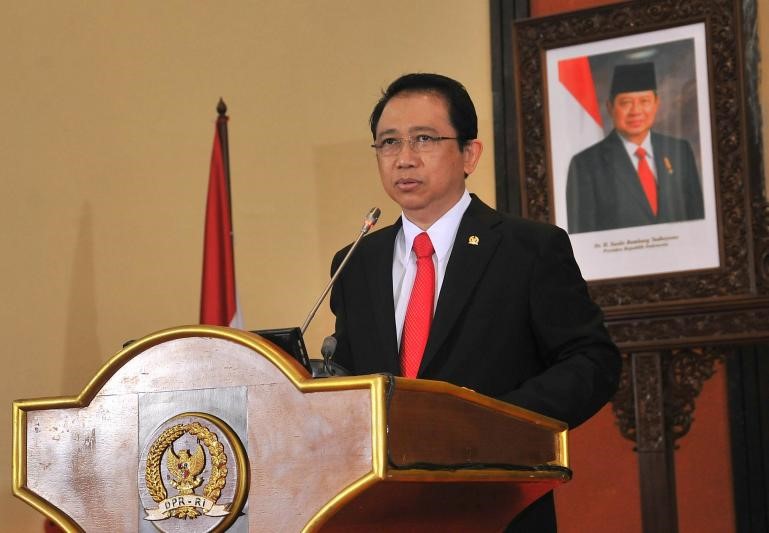
Editor’s Note: April 13, 2025 marks the 75th anniversary of diplomatic ties between China and Indonesia, which have been boosted by presidential visits. China Daily has conducted interviews on visits of Chinese President Xi Jinping and the Belt and Road Initiative Xi raised partly during his 2013 visit.
The growing diplomatic and economic cooperation between Indonesia and China since President Xi Jinping’s visit in 2013 can further help Jakarta’s pursuit of low-carbon development and positive regional role, former Indonesian legislator Marzuki Alie said.
Marzuki — speaker of the Indonesian House of Representatives from 2009 to 2014 — said he sees bilateral ties growing under the Belt and Road Initiative (BRI) that Xi partly proposed during his 2013 visit to Indonesia.
As BRI keeps bringing opportunities to the Global South, Marzuki said China and Indonesia can expand their collaboration to build “more efficient and environmentally friendly transportation” such as electric vehicles.
There are also “great opportunities” for the two countries to jointly develop renewable sources such as solar, wind, and hydropower.
ALSO READ: Xi, Indonesian president celebrate 75 years of diplomatic ties
Marzuki said these investments in green technologies align with Indonesia's commitment to reduce carbon emissions and build a low-carbon economy.
“With its expertise in the production of renewable energy technologies, China can be a strong strategic partner in Indonesia’s initiatives,” Marzuki told China Daily.
On Oct 3, 2013, President Xi delivered his speech before a special joint session of parliamentarians, an event Marzuki helped arrange to make history. At that time, the parliament was in recess, Marzuki recalled, moreover, the country did not have a tradition of its parliamentarians hearing speeches by leaders of other countries.
Marzuki considered it a “privilege” for Indonesian lawmakers to listen to Xi’s important speech and Xi became the first foreign head of state to speak before the Indonesian parliament. Xi’s forthcoming messages needed to be heard by lawmakers, Marzuki said.
Xi proposed the 21st Century Maritime Silk Road during that speech in Indonesia, a month after raising the Silk Road Economic Belt initiative on a trip to Kazakhstan that September. The two projects would come to be known as the Belt and Road Initiative.
Xi’s speech was “very important” not only for Indonesia-China relations but also for fostering international cooperation, Marzuki said.
READ MORE: China launches offshore drilling project with Indonesia
“President Xi emphasized the Belt and Road Initiative as a part of peace and cooperation, openness and inclusiveness, mutual learning, and mutual benefit,” he said. BRI facilitates the development of participating countries, which also contributes to the good of the global economy.
The synergy between the BRI and Indonesia’s Global Maritime Fulcrum has led to “tangible cooperation” in various sectors. For example, Chinese companies are helping develop Indonesia's economic corridors in North Sumatra, North Kalimantan, North Sulawesi, and Bali.
Another example of concrete cooperation under the BRI in Indonesia is the Jakarta-Bandung High-Speed Railway. Southeast Asia’s first high-speed train line was built using Chinese standards and technology.
President Xi's offer was important for the government to address, he said, particularly as in the subsequent years under President Joko Widodo — who led the country from 2014 to 2024 — Indonesia aspired to become a global maritime hub.
Now that the country is led by President Prabowo Subianto, Indonesia's political stance and economic cooperation have become clear, Markuzi said. As a new member of BRICS, Indonesia’s significant economic potential can expand economic collaboration, strengthen its diplomatic position in international forums, and diversify its trade and investment fund sheet.
The BRI helps the development efforts of participating countries, which also benefits the global economy. Since its launch in 2013, around 150 countries and 32 international organizations have joined the BRI.
READ MORE: China congratulates Indonesia on becoming full member of BRICS
“The BRI has served as a springboard for China's global leadership in financing connectivity infrastructure across the Global South. In doing so, it has reinforced China's position as the primary funding partner for developing countries,” Marzuki said.
As the dynamic of BRI cooperation continues to evolve, Chinese investments are also going towards small but meaningful projects with higher standards and better returns. This shift is evident in the discussions surrounding green energy and the digital secret focusing on the telecommunications and cloud computing industries.
Marzuki said technology and the digital economy are also important aspects of China-Indonesia bilateral relations. He said thanks to China’s emergence as a global leader in digital technologies — including 5G, artificial intelligence, and e-commerce — bilateral cooperation could help accelerate Indonesia’s digital transformation.
“China offers opportunities, and this is what differentiates the BRI from other projects initiated by colonialized countries,” he said. Moreover, the concepts of the Global Development Initiative, Global Security Initiative, and Global Civilization Initiative raised by President Xi in recent years further enrich his vision for the global community.
Bilateral cooperation could also lead to increased tourism between the two countries and strengthen cultural exchanges, he added.
“Going forward, Indonesia and China are expected to adopt a more sustainable approach to BRI cooperation,” Marzuki said. This includes implementing development practices that consider both environmental and social aspects as well as increasing transparency and involving local communities in major projects.
“As a result, bilateral cooperation can bring broader benefits and foster inclusive and sustainable economic growth,” he added.
Billie Widjaja in Jakarta contributed to this report.
Contact the writers at prime@chinadailyapac.com


